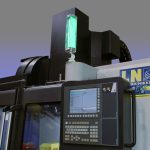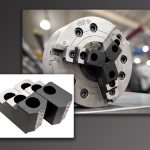Unlocking the potential of AI
Unlocking the potential of AI
The manufacturing industry stands on the brink of a technological revolution driven by AI.
EDITOR'S NOTE: This report is an amalgam of several recent industry events attended by CTE Editor & Publisher Dennis Spaeth during his travels in April and early May.
I have to admit, when I recently set out on a series of industry related trips — both far and near — the subject of artificial intelligence (AI) was not on my radar for this June issue. Then I attended CERATIZIT Open Days 2024 in early April for a media event highlighting the toolmaker's newest technologies and facilities located throughout Germany and Austria. When the subject of AI came up during a panel discussion the first day, an idea for this report began percolating.
The following week, I heard more about AI during a day trip to the "Efficient Manufacturing of Orthopedic Implants" seminar held at Grace College in Winona Lake, Indiana. Organized by GF Machining Solutions, Lincolnshire, Illinois, the seminar presented the latest advances in orthopedic implant manufacturing. Among the participating companies presenting was ZEISS Industrial Quality Solutions, Maple Grove, Minnesota, which outlined the potential for AI to overcome technical limitations related to quality assurance analysis of orthopedic implants. Not only can AI improve orthopedic implant productivity and process reliability, it would be particularly helpful meeting federal regulatory requirements for an audit trail of the entire manufacturing process.

Siemens presented the first generative artificial intelligence (AI) product for engineering in an industrial environment at Automate 2024. Image courtesy of Siemens
Then, about a week later while attending the MFG 2024 meeting in Orlando, Florida, I noticed the first keynote presentation, titled "ChapGPT, AI and beyond: Game-changing technologies that will impact your industry." The keynote presenter was Gene Marks, an author and the owner of the Marks Group PC, which provides technology and consulting services to small- and medium-sized businesses.
The chief takeaway from the keynote presentation was this: "Clean up your data in 2024," Marks told the audience. Cleaning up your data now, he said, is the best way to prepare for the next step, which will be to invest in AI beginning in 2025.
While attending Automate 2024 in Chicago early last month I heard a good deal more about how AI integration is already underway within manufacturing. At Automate, Siemens Digital Industries, Nuremberg, Germany, announced that its SIMATIC Automation Workstation connects internet technology workflows to operational technology environments.
With the SIMATIC workstation, manufacturers will be able to run an expanded variety of modular applications for motion control, sequencing and safety. Deployment of the technology is already planned for a number of Ford Motor Company manufacturing facilities.
Given all the AI-related information collected during my travels, I turned to ChatGPT for help sifting through hours of recorded notes. Here's how ChatGPT summed up all the information I fed into it.
"The manufacturing industry stands on the brink of a technological revolution driven by AI. As businesses seek to harness the power of AI to enhance productivity, optimize operations and deliver quality products and services, it becomes imperative to navigate the complexities and challenges associated with AI adoption."
ChatGPT also followed up with what I consider to be a nice transition to wrap up this report by highlighting a series of "essential considerations for unlocking the full potential of AI in manufacturing" that it culled from my recorded notes.
Data cleanup and management
As mentioned earlier, Marks, the MFG 2024 keynote speaker, stressed the importance of cleaning up your data this year as you prepare for 2025. He emphasized the need to understand AI capabilities and its implications for workplace productivity and customer service. Marks advised businesses to engage with software vendors to explore their AI integration plans and opportunities..
Luis Hernandez, technical sales engineer at ZEISS Industrial Quality Solutions, Maple Grove, Minnesota, underscored the need for clean data a week earlier at the medical orthopedic implant seminar. Data preparation is a critically important step on the path to successful AI implementation. He highlighted the challenges of unclean data and emphasized the need for standardized data formats, accurate labeling and comprehensive documentation.
Hernandez also noted the importance of selecting suitable software platforms for AI integration. He encouraged shops to lean into software platforms and engage with vendors to understand how AI can enhance their operations.
Don't fear the AI evolution
Circling back to the AI panel discussion during the CERATIZIT Open Days 2024 event in early April, Melissa Albeck, a member of the CERATIZIT Executive Board addressed the elephant in the room: will AI destroy more jobs than it can create? She acknowledged that AI and digitalization are changing the types of job skills needed for manufacturing, eliminating certain manual tasks.
"It's a good thing, I think, that humans no longer have to do a lot of the jobs in production that are more manual and alone in the middle the night — things that are less pleasant," she explained. "If the dirty work can be done by machines, as it were, that frees up people to do more of the thinking tasks, the managerial tasks."
Uwe Schleinkofer, director of research and development for CERATIZIT, provided a bit of context to the discussion that may ease any AI misgivings anyone may harbor in terms of job security. "Human expertise is a mixture of experience plus creativity," he told a roomful of industry journalists. "AI is data in-breeding. We don't create anything new with AI, we just use that which already existed."
Or, to paraphrase, human experience and creativity stands to benefit greatly from AI's ability to wrap its "mind" around mountains of data to help produce an end result efficiently — which is what ChatGPT did for me while putting together this report.





